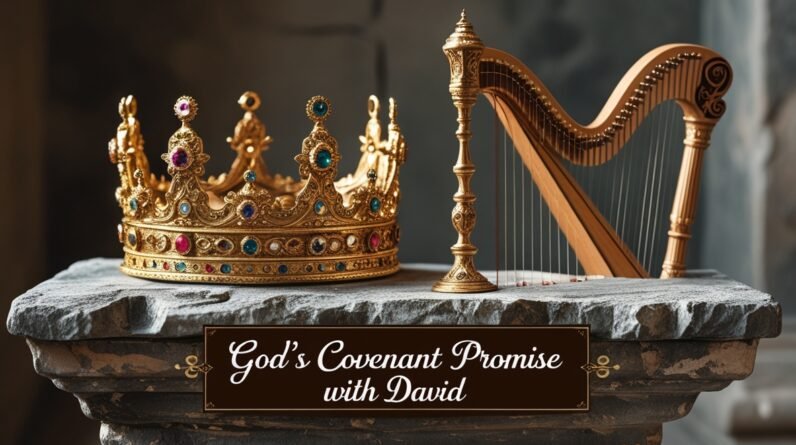7 Timeless Promises Of God In The Old Testament
You’re standing at the edge of a long, rich story—the story of God’s dealing with people across generations. The Old Testament is full of promises that shaped lives, nations, hope, and faith. These are not stale historical notes; they are living words that still reach across time to meet you where you are. In this article, you’ll walk through seven timeless commitments God made in the Old Testament, see how they were lived out in the lives of Abraham, Moses, David, and the prophets, and learn how they apply to your life today. Throughout, we’ll point you to the Bible so you can read the text for yourself.
Before you read on, remember that when you study faith, context matters. You’ll see direct Old Testament passages and prophetic writings that reveal God’s character—his faithfulness, justice, mercy, and plans for his people. These are not merely ancient notes; they’re the very scaffolding of Christian hope. In the paragraphs below, you’ll encounter examples, practical application, and a prayerful tone to help you own these truths. Along the way, you’ll find dependable scripture links from Bible Gateway so you can read the verses in context and let the Word speak to your heart.
The phrase Old Testament promises of God captures the heartbeat of this piece—those assurances God gave to his people before Christ’s coming that still inform your faith and trust today.
1. The Promise of Presence: “I will be with you”
You’ve probably heard it said that the most comforting words in Scripture are “I am with you.” This promise echoes across the Old Testament and is displayed vividly in the life of Moses, who encountered God at the burning bush and heard the assurance that he would not go alone. That promise isn’t abstract; it’s a covenantal commitment from a God who comes near. When Moses worried about his ability, God said he would stand with him—this tells you something critical: God’s commitment often precedes your ability.
Read it in the text: When Moses protested, God answered, “I will be with you.” See Exodus 3:12. The people received a related promise before entering the Promised Land: “Do not be afraid… for the Lord your God goes with you; he will never leave you nor forsake you.” See Deuteronomy 31:6.
How does this promise land in your life? First, it changes how you handle fear. When you sense anxiety about a decision, you can lean on the fact that God’s presence is not conditional on your performance. Second, it changes how you approach service and calling: God’s promise to be with you empowers you to take steps you might otherwise avoid. Finally, it’s pastoral: this presence is relational—God is not a distant supervisor but a companion who journeys with you.
The promise of presence is one of the key Old Testament promises of God because it establishes trust before the test comes. When you face your giants, remember Moses at the bush—God promises to go with you into the unknown.
Biblical examples and application
Moses felt inadequate, yet God affirmed him and provided signs. Joshua later inherited the same promise as he prepared to lead the nation into the land. See Joshua 1:5-9. You can claim the same assurance when you step into leadership, caregiving, or any situation where courage is required. Pray brief, specific prayers asking God to make his presence felt, and then step forward in faith.
2. The Promise of Blessing and Multiplication: Abraham’s covenant
God’s covenant with Abraham is foundational. When God called Abraham he promised to make him into a great nation, to bless him, and to bless all the families of the earth through him. This is not merely a promise of numerical increase; it’s a spiritual guarantee that God’s blessing will create channels for hope, righteousness, and redemptive impact.
You can read the core call to Abraham in Genesis 12:2-3, where God says he will make Abraham into a great nation and bless him so that he will be a blessing to others. The expansion of that covenant—God promising descendants as numerous as the stars—appears in Genesis 15:5. The covenant with an everlasting dimension is affirmed in Genesis 17:7-8.
This covenant shows you that God’s promises are often both personal and missional: he blesses individuals so that blessing flows outward. In practical terms, when God blesses you—through resources, opportunity, or spiritual gifts—he expects that blessing to be a conduit for blessing others. Abraham’s story also teaches patience: God’s promises can take time to fulfill, but their fulfillment is anchored in God’s faithfulness, not your timetable.
This Abrahamic promise ranks among the Old Testament promises of God because it shapes God’s long-term plan of redemption and blessing, culminating in Christ, through whom every family is ultimately blessed.
3. The Promise of Land and Inheritance: A place to belong
When God promised the land to Abraham and his descendants, he was promising more than square mileage—he was promising stability, identity, and a place for God’s purposes to take root. The land promise appeared early: God told Abram, “To your offspring I will give this land,” which anchors the people of Israel in a physical and theological home. See Genesis 12:7.
For Israel, the land functioned as a tangible sign of God’s faithfulness. It created a setting for worship, law, and societal life. For Moses and the generation that wandered, the promise of land was both a motivator and a test; it showed that God’s promise often invites human cooperation—even while God remains sovereign over the outcome. The later leaders, including Joshua, took that promise seriously when leading the people to claim the inheritance. See Joshua 1:3.
How does that translate for you today? The “land” may be literal—your home, your work environment, your neighborhood—or it may symbolize a spiritual inheritance: a sense of belonging and purpose in God’s family. You can live out this promise by cultivating stewardship: protecting what God has entrusted to you—your relationships, your community, and your calling—so they can be places where God’s presence and blessing are evident.
The promise of an inheritance ties into other Old Testament promises of God because it centers identity and God’s intention to create a people who reflect his character.
4. The Promise of a Davidic King: A throne established forever
You might be surprised by how personal God’s promise to David is. God promised David that his house and kingdom would be established forever—this is the Davidic covenant, and it foreshadows the coming of a king whose reign would bring justice and peace. Read the heart of that promise in 2 Samuel 7:12-16. There God promises a descendant who will secure a lasting throne.
David’s story is instructive for you: God doesn’t pick flawless people; he picks obedient, repentant hearts. David experienced highs and lows, yet God’s promise endured. That promise points forward to the Messiah—one who would reign on David’s throne eternally. The prophets later echo and amplify this hope, connecting the dynasty of David to a future deliverer. See Psalm 89:3-4, 34-37.
How do you live under this promise? You remember that leadership is accountable to God’s standards. God’s commitment to establish a righteous rule reminds you that your leadership—whether in family, workplace, or church—should reflect justice, mercy, and humility before God. The Davidic promise is one of the Old Testament promises of God that points both backward to Israel’s history and forward to the ultimate King whose reign brings restoration.
David, kingship, and your confidence
David’s covenant assures you that God’s purposes transcend human failure. You can find confidence not in your stability but in God’s steadfastness. When you struggle with leadership insecurity, remember that the model of a godly leader is not perfection but reliance on God—and that God’s long-term plans often outlive immediate setbacks.
5. The Promise of Redemption: The coming Messiah
This is the promise you’ve likely been taught to expect: the prophets spoke of a Redeemer who would restore what was broken—sin, exile, and spiritual bondage. The prophetic books are full of messianic hope. Isaiah’s visions of a suffering servant and an eternal ruler (see Isaiah 9:6-7 and Isaiah 53) point to both the suffering and the victory of the one who would bring salvation. Micah pinpoints the origin: “But you, Bethlehem… from you shall come forth” the ruler in Israel’s history. See Micah 5:2.
The prophets give you a multi-faceted portrait of the Messiah: powerful king, humble servant, suffering redeemer, and source of justice. Jeremiah’s promise of a righteous Branch also contributes to the picture. See Jeremiah 23:5-6.
What does this mean for you? The promise of a Redeemer anchors your hope. If you’re carrying guilt, this promise assures you that God has a plan to address the root problem—sin. If you feel the world is falling apart, the prophetic promise reassures you that God’s ultimate rule will bring justice and peace. The expectation of a Savior also motivates you to live in holiness and mission, knowing that God’s redemptive work includes you and extends through you.
The promise of a coming Redeemer ranks as a central Old Testament promise of God because it shapes the trajectory of Scripture toward restoration and fulfills the covenantal dreams established earlier.
6. The Promise of Guidance and God’s Law: Wisdom for Life
God didn’t leave his people to fend for themselves. He gave instructions—laws, commands, and wisdom literature—to show people how to live in relationship with him and with one another. The Torah is not legalism; it’s a guide to flourishing. Psalm 119 celebrates God’s law as a lamp to your feet and a light to your path. See Psalm 119:105.
Moses received the law at Sinai, and those statutes functioned as formative instruction for communal life, worship, and justice. See Exodus 20:1-17 for the Ten Commandments. The law’s role was not simply punitive; it was pedagogical—it taught God’s people how to reflect his character in daily living.
How do you apply this? View God’s guidance as liberating rather than restrictive. The commands are designed to protect relationships, preserve dignity, and cultivate a society where God’s presence can dwell. When you’re tempted to isolate spiritual life from daily life, remember that God’s instructions speak into your finances, family, speech, and work. Studying Scripture with prayer will help you receive God’s guidance for specific decisions, and practicing obedience is the way you internalize God’s wisdom.
This guidance is one of the Old Testament promises of God because it commits God not only to be present but to provide the means for his people to live rightly in his presence.
7. The Promise of Restoration and Hope: New heart, new future
The prophets carry a consoling message: exile and judgment are not the final word. God promises to restore his people—to return them from exile, to renew their hearts, and to establish a future of hope. Jeremiah captures this beautifully in a promise of restoration and plans for welfare, not calamity: “For I know the plans I have for you…” See Jeremiah 29:11. Ezekiel adds depth by promising a new heart and spirit for God’s people—something internal and transformative. See Ezekiel 36:26-27.
This promise assures you that brokenness is not irreparable. God intends not merely to return people to their old status but to renew their inner life so they can live with God’s values and power. The prophets’ hope centers on deep change—spiritual revival that renews communities, families, and nations.
For your life, this promise means you can expect renewal. If you are spiritually worn out, discouraged, or stuck in patterns of behavior you cannot break, God’s promise of a new heart gives you hope. It invites you into confession, repentance, and an openness to the transforming work of the Spirit. It’s a pastoral promise: God comes to heal you where you are and to give you a future marked by his purposes.
Restoration is one of the chief Old Testament promises of God because it both vindicates God’s justice and displays his mercy—showing you that even failure is an opportunity for divine renewal.
Prophets and the living hope
The prophets functioned as both warners and encouragers. They called people back to covenant faithfulness but also pointed forward to God’s future action. Isaiah’s words of comfort in Isaiah 40:1-2 and the promise of a new covenant in Jeremiah’s later writings are examples of prophetic messages that stir hope. See Jeremiah 31:31-34. As you read these, let the prophets’ blend of conviction and consolation shape your expectation: God disciplines to restore, and he restores to renew.

Faithfulness Across Generations: What ties these promises together?
When you step back and look, you’ll notice a pattern: God’s promises are consistent—presence, blessing, land, kingship, redemption, guidance, and restoration. These themes weave through Abraham, Moses, David, and the prophets. Each figure plays a role—Abraham as the father of faith, Moses as lawgiver and deliverer, David as the king whose line is promised perpetuity, and the prophets as interpreters and heralds of God’s future work.
The continuity matters because it shows you that God is not changing his mind. The same God who vowed presence to Moses and an everlasting throne to David is the God who promises redemption in the prophets. Lamentations reminds you that God’s steadfast love never ceases: “The steadfast love of the Lord never ceases; his mercies never come to an end.” See Lamentations 3:22-23.
This continuity shapes how you pray and live. You don’t chase random spiritual impulses; you align with God’s revealed purposes. You’ll notice that the promises often combine personal blessing with communal responsibility—God blesses you so you can bless others.
The continuity of Old Testament promises of God anchors your faith in a storyline that culminates in Christ and extends into your life today.
Practical steps to live in these promises
You might be asking, “So what? How do these ancient promises change my life now?” Here are practical, pastoral steps you can take to align your daily life with these enduring truths—steps that echo the pastoral tone of scripture and the practical application you’d expect from seasoned ministry.
- Read regularly: Spend consistent time in the Old Testament passages linked above. Let the narrative shape your imagination of who God is.
- Pray intentionally: Use the promises as a framework for prayer—claim presence when you feel alone, ask for guidance when you’re unsure, and seek restoration when you’re broken.
- Practice community: God’s promises often involve a people. Join a local congregation or small group where these promises can be embodied.
- Steward faithfully: Your resources, time, and gifts are instruments of blessing. Steward them with generosity.
- Expect long-term fulfillment: Some promises unfold slowly. Cultivate patience and faithfulness.
These steps help you move from theological appreciation to lived faith. When you practice them, you’re not merely studying history—you’re stepping into a living covenant relationship where God’s promises have direct impact on your relationships, decisions, and sense of purpose.
How the Old Testament promises of God point to Jesus
You cannot fully appreciate the Old Testament promises of God without recognizing their Christ-centered fulfillment. Jesus embodies the presence God promised (Emmanuel—“God with us”), he fulfills the Abrahamic blessing by bringing salvation to the nations, he is the Davidic king, he fulfills the law’s intent and completes the prophecies of restoration and redemption. The New Testament consistently reads the Old Testament as a preparation for Christ—he is both the goal and the fulfillment.
Consider a few connections: the suffering servant in Isaiah finds fulfillment in the work of Christ (see Isaiah 53); the promise of a new covenant (Jeremiah 31:31-34) is enacted in Jesus’ words at the Last Supper and by his sacrificial work (see Jeremiah 31:31-34 and Luke 22:20 in the New Testament). These linkages help you see the Old Testament not as a separate religion but as the foundation of the one unfolding story of God’s saving work.
When you study the Old Testament promises of God, you gain a fuller view of who Jesus is and why his coming matters. The promises are not a dead list but a living trail of bread crumbs leading to the cross and the empty tomb.
Final encouragement: Claim these promises in your life
As you move forward, don’t treat these promises like museum pieces. They are meant to be lived. God’s promises in the Old Testament were given to real people in real circumstances—and they were meant to shape identity, action, and hope. Whether you’re facing fear, longing for blessing, seeking direction, or yearning for renewal, you can approach God with the confidence that he is faithful to his word.
Pray through the promises that most speak to your situation. Ask God to make his presence palpable, his guidance clear, his restorative power active. Celebrate the truth that God’s plan is larger than your immediate circumstances and that his promises persist across generations. Lamentations reminds you that God’s mercies are new each morning; this is not only theological language but practical encouragement for daily life. See Lamentations 3:22-23.
If you commit to living by these promises, you’ll find your life shaped by hope rather than fear, by mission rather than mere maintenance, and by God’s faithfulness rather than your own strength. Let these ancient assurances inform how you pray, how you serve, and how you invest in the people around you.
Remember that the Old Testament promises of God are not obsolete—they are fulfilled, extended, and made personal in Christ, and they continue to be the foundation for your confidence and direction today.
Explore More
For further reading and encouragement, check out these posts:
👉 7 Bible Verses About Faith in Hard Times
👉 Job’s Faith: What We Can Learn From His Trials
👉 How To Trust God When Everything Falls Apart
👉 Why God Allows Suffering – A Biblical Perspective
👉 Faith Over Fear: How To Stand Strong In Uncertain Seasons
👉 How To Encourage Someone Struggling With Their Faith
👉 5 Prayers for Strength When You’re Feeling Weak

📘 Jesus and the Woman Caught in Adultery – Grace and Mercy Over Judgement
A powerful retelling of John 8:1-11. This book brings to life the depth of forgiveness, mercy, and God’s unwavering love.
👉 Check it now on Amazon
As a ClickBank Affiliate, I earn from qualifying purchases.
Acknowledgment: All Bible verses referenced in this article were accessed via Bible Gateway (or Bible Hub).
“Want to explore more? Check out our latest post on Why Jesus? and discover the life-changing truth of the Gospel!”








